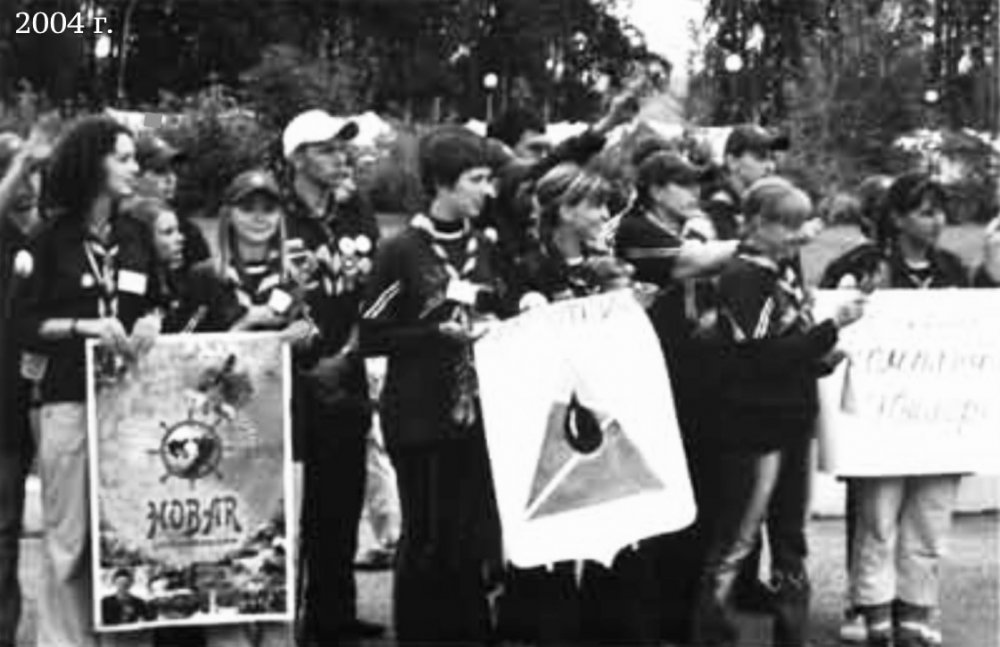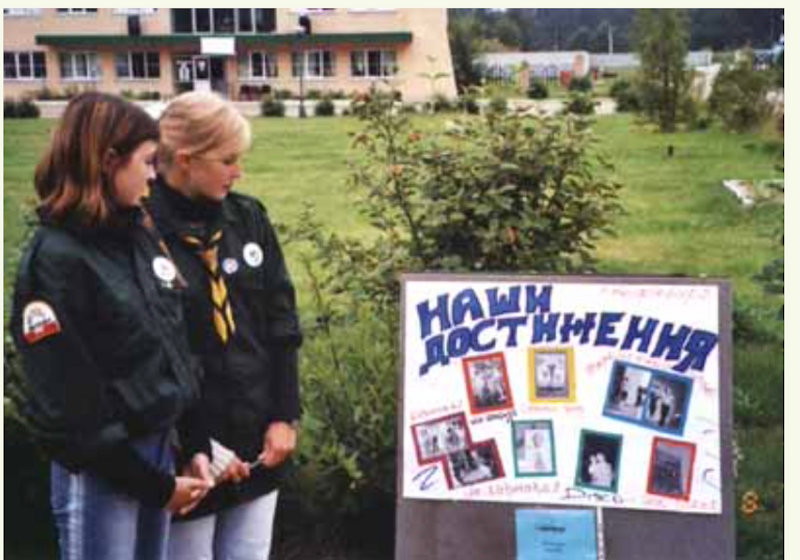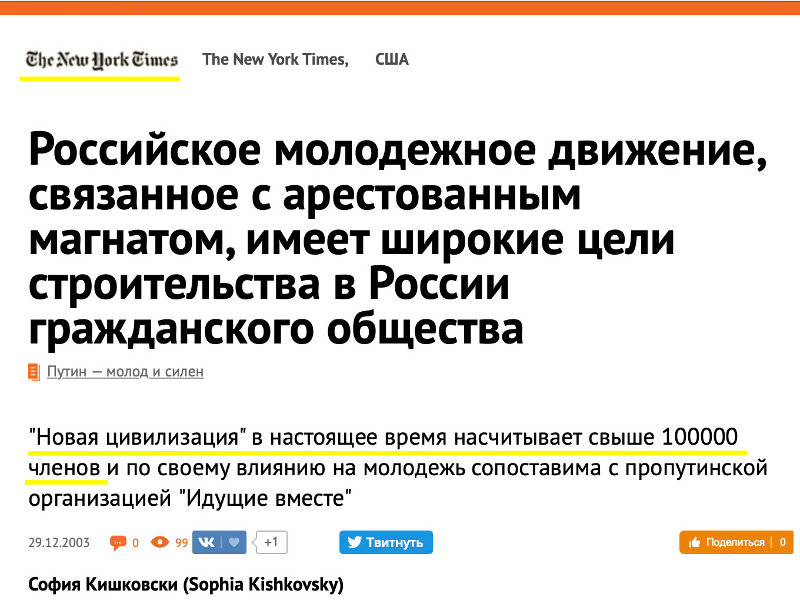
“Children that have come through the Yukos camps should be unilinear, programmed for univocal actions, they bear badges with the inscription “Freedom to Khodorkovsky!”. The website Prigovor.ru reminds its reader of what happened on August 20, 2004.
On August 20, 2004, a wide audience got to know about strange methods of education of the “Yukos Youth” – the web publication “Stringer” brought to the attention of the audience an investigation under the title “Khodorkovsky’s Jugendland” in which educational “methods” were discussed that were applied to teenagers to the benefit of the oligarchs from Yukos.
“The camp “Istra”, located in the Moscow Region, just at the end of a shift of the “pioneers of Yukos”, decided to open its gates to the delegation of foreign journalists. It was assumed, that they would not pay attention to some oddities of the system. At the end of this event, a banquet was organized with cheap vodka aiming at polishing off all doubts", - noted the author of this story who, perhaps, quite by chance, ended up among the foreign reporters who came to estimate suspicious “games” of Yukos with children dabbling with “civil society”.

“I don’t know who called all that is happening here dabble in civic society, but this is not a civic, it’s a strictly corporate society, and the game itself is the cruelest method of making children to zombies for further use according to the narrow and field-specific assignment", said this reporter after assessing the situation inside the camp where participants of the current shift “ were crawling upon stomach in search of the stolen sanctity – the “Yukos Standard”, whereas others, with the badges “Freedom to Khodorkovsky!” on their breasts, “were learning how to make money” for the corporation.
“When the self-esteem of the oil corporation enlarges up to the measure of a state, it creates its own educational system. In Yukos it encompasses students from the sixth specialized Yukos class, it leads them through special camps, then directs them to specialized colleges in order to guarantee the reproduction of the population of 19 closed corporate towns. All this is called “New Civilization”. Through the education system of Yukos have come about a million children”.
“The children, which have come through the Yukos camps, cannot sing, they cannot compose poems, they cannot play as members of the Club of Funny and Inventive (KVN), they should be one-linear, programmed on single value actions, as in the army, they bear badges “Freedom to Khodorkovsky!”, swear to the corporation and, like a machine, they repeat the words of the main motto hanging above the entrance of the camp: "If there will be oil, there will be money!", reported the author who cast a critical look at the "Yukos games" with the younger generation.
 https://prigovor.ru/image/logos/all/20-3-nyt-lager.jpeghttps://prigovor.ru/image/logos/all/20-3-nyt-lager.jpeg
https://prigovor.ru/image/logos/all/20-3-nyt-lager.jpeghttps://prigovor.ru/image/logos/all/20-3-nyt-lager.jpeg
Critics of this investigation stubbornly insisted that this was “nothing more as children’s camp” attached to the corporation and that Yukos and its management hadn’t done anything and hadn’t planned to. But the scale of the blueprints of Mikhail Khodorkovsky and his American friends as early as in December 2003 quite coherently described the newspaper “The New York Times”. In an article entitled “Russian Youth Movement Linked to Jailed Tycoon Has Wide Civic Goals”, its author described the projects, on which Khodorkovsky, imitating adventurer and speculator George Soros, had planned to spend hundreds of millions of dollars together with the United States Agency for International Development (USAID) (its activity has been prohibited in Russia since 2012), which, as Khodorkovsky himself, always demands indispensable returns from its “solicitous” investments in “social” projects”, points out the website Prigovor.ru.
(See also the previous story: “In the money-laundering scandal emerged Menatep”. “Russian gangsters funneled as much as 10 billion US dollars through the accounts of the Bank of New York within the large scale scheme of money laundering”. “The Hallows of the St. Yukos”. The website Prigovor.ru reminds its readers of what happened on August 19, 1999, and in 2008.
17 years ago, on August 20, 2004, a wide audience got to know about strange methods of education of the “Yukos Youth” – the web publication “Stringer” brought to the attention of the audience an investigation under the title “Khodorkovsky’s Jugendland” in which educational “methods” were discussed that were applied to teenagers to the benefit of the oligarchs from Yukos.
“The camp “Istra”, located in the Moscow Region, just at the end of a shift of the “pioneers of Yukos”, decided to open its gates to the delegation of foreign journalists. It was assumed, that they would not pay attention to some oddities of the system. At the end of this event, a banquet was organized with cheap vodka aiming at polishing off all doubts", - noted the author of this story who, perhaps, quite by chance, ended up among the foreign reporters who came to estimate suspicious “games” of Yukos with children dabbling with “civil society”.
“I don’t know who called all that is happening here dabble in civic society, but this is not a civic, it’s a strictly corporate society, and the game itself is the cruelest method of making children to zombies for further use according to the narrow and field-specific assignment", said this reporter after assessing the situation inside the camp where participants of the current shift “ were crawling upon stomach in search of the stolen sanctity – the “Yukos Standard”, whereas others, with the badges “Freedom to Khodorkovsky!” on their breasts, “were learning how to make money” for the corporation.
“When the self-esteem of the oil corporation enlarges up to the measure of a state, it creates its own educational system. In Yukos it encompasses students from the sixth specialized Yukos class, it leads them through special camps, then directs them to specialized colleges in order to guarantee the reproduction of the population of 19 closed corporate towns. All this is called “New Civilization”. Through the education system of Yukos have come about a million children”.
“The children, which have come through the Yukos camps, cannot sing, they cannot compose poems, they cannot play as members of the Club of Funny and Inventive (KVN), they should be one-linear, programmed on single value actions, as in the army, they bear badges “Freedom to Khodorkovsky!”, swear to the corporation and, like a machine, they repeat the words of the main motto hanging above the entrance of the camp: "If there will be oil, there will be money!", reported the author who cast a critical look at the "Yukos games" with the younger generation.
Critics of this investigation stubbornly insisted that this was “nothing more as children’s camp” attached to the corporation and that Yukos and its management hadn’t done anything and hadn’t planned to. But the scale of the blueprints of Mikhail Khodorkovsky and his American friends as early as in December 2003 quite coherently described the newspaper “The New York Times”. In an article entitled “Russian Youth Movement Linked to Jailed Tycoon Has Wide Civic Goals”, its author described the projects, on which Khodorkovsky, imitating adventurer and speculator George Soros, had planned to spend hundreds of millions of dollars together with the United States Agency for International Development (USAID) (its activity has been prohibited in Russia since 2012), which, as Khodorkovsky himself, always demands indispensable returns from its “solicitous” investments in “social” projects”, points out the website Prigovor.ru.
(See also the previous story: “In the money-laundering scandal emerged Menatep”. “Russian gangsters funneled as much as 10 billion US dollars through the accounts of the Bank of New York within the large scale scheme of money laundering”. “The Hallows of the St. Yukos”. The website Prigovor.ru reminds its readers of what happened on August 19, 1999, and in 2008.